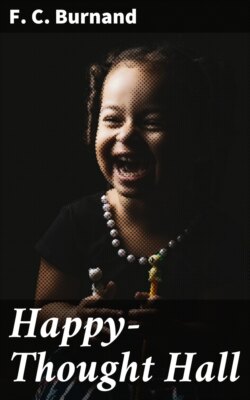Читать книгу Happy-Thought Hall - F. C. Burnand - Страница 6
На сайте Литреса книга снята с продажи.
CHAPTER III.
ОглавлениеTable of Contents
WITHIN—THE HOUSEKEEPER—WINDOWS—INFORMATION—THE ORIEL—VIEW—FLOOR—MILBURD'S INQUIRY—TYPICAL DEVELOPMENT—MATERIAL—AN EXAMPLE—CRONE—POOR—MEDITATIONS—THE FRESCO—TAPESTRY—ARMOUR—MICE—RATS—THE GHOST.
n old woman curtseys, and ushers our party into the Hall itself, which is lofty and spacious, but in a mildewy condition.
The floor is partly stone partly tiles, as if the original designer had been, in his day, uncertain whether to make a roof of it, or not.
A fine old chimney, with a hearth for logs, and dogs, is at one end, and reminds me of retainers, deer hounds, oxen roasted whole, and Christmas revels in the olden time.
The windows are diamond-paned. To open in compartments.
The old woman tells us that this was rebuilt in fifteen hundred and fifty-two, and then she shows us into the drawing-room.
This is a fine apartment with an Oriel window, giving on to a lawn of rank and tangled grass. Beyond this chaos of green, is a well timbered covert, dense as a small black forest.
The distance between the trees becoming greater to the left of the plantation, we obtain a glimpse of the lake which we passed on our road.
There is another grand fire-place in this room. The wainscot wants patching up, and so does the parqueted floor.
The old woman tells us that “they say as Queen Elizabeth was once here.”
Milburd asks seriously, “Do you recollect her, ma'am?”
The crone wags her head and replies “that it was afore her time.”
Mentioning the word Crone to Boodels, I ask him what relation it bears to ‘Cronie.’ “ ‘Cronie,’ almost obsolete now, means ‘a familiar friend,’ ” I explain to him. He says thank you, and supposes that the two words have nothing in common except sound.
The notion being in fact part of my scheme for Typical Developments (Vol. XIII. Part I. “On sounds of words and their relation to one another”), I offer him my idea on the subject.
He asks, “What is it?”
Happy Thought.—“Crone” is the feminine of “Cronie.” “Cronie” is an old friend, “Crone” is an old friend's old wife. Which sounds like a sentence in one of my German Exercises. “The Old wife of the Old friend met the Lion in the garden.”
Boodels says “Pooh!” If he doesn't understand a thing at once he dismisses it with “pooh.” As I ascend the wide oak staircase, with room enough for eight people abreast on every step, I reflect on the foolishness of a man saying “pooh,” hastily. How many great schemes might anyone nip in the bud by one “pooh.” What marvellous inventions, apparently ridiculous in their commencing idea, would be at once knocked on the head by a single “pooh.” The rising Artist has an infant design for some immense historical Fresco. He comes—I see him, as it were, coming to Boodels to confide in him. “I mean,” says he, “to show Peter the Great in the right-hand corner, and Peter the Hermit in another, with Peter Martyr somewhere else, … in fact, I see an immense historical subject of all the Celebrated Peters. … Then why not offer it to St. Peter's at Rome, and why not … ?” “Pooh!” says Boodels, and the artist perhaps goes off and drowns himself, or goes into business and so is lost to the World. If I'd listened to Boodels' “Pooh,” I should never have got on so far as I have with my work on Typical Developments. I hope to be remembered by this.
Milburd is calling me. Everyone in ecstasies. What wonderful old chambers. Oak panels, diamond panes. Remains of tapestry, containing probably a fine collection of moths. Old rusty armour on the walls. Strange out-of-the-way staircases leading to postern-doors and offices.
Chilvern observes that it all wants doing up, and commences making plans and notes in a book, which he takes from his pocket, in company with a small ivory two-foot rule.
“Plenty of mice,” says Cazell, looking at the old woman for corroboration.
“Yes, in winter-time,” she says.
“And rats?” inquires Milburd.
“I've met 'em on the stairs,” replies the old lady, quite cheerfully.
“Ghosts, too?” suggests Boodels. [He has become somewhat melancholy of late and says that he is studying the phenomena of “Unconscious Cerebration,” which Milburd explains is only a name for thinking of nothing without knowing it. Boodels, in consequence, thinks Milburd a mere buffoon.]
“Well, my husband,” she answers in a matter-of-fact way, “my husband, he see the Ghost … I think it were last Christmas twelvemonth.”
“The Ghost!” exclaims Boodels, much interested.
“Yes, the White Lady,” says the old woman as pleasantly as possible. “There's the marks on the floor of the stain where she was murdered. There! that gentleman's standing on it.”
Good gracious! so I am. A dull sort of mulberry-coloured stain. “It won't wash out,” she goes on. “I've tried it. And it won't plane out, as they've tried that. And so,” she finishes with a sniff, “there it is.”
